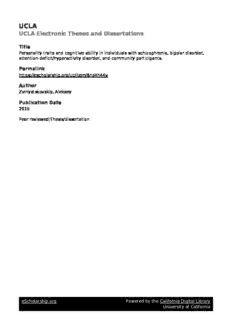
Personality traits and cognitive ability in individuals with schizophrenia, bipolar disorder, attention PDF
Preview Personality traits and cognitive ability in individuals with schizophrenia, bipolar disorder, attention
UCLA UCLA Electronic Theses and Dissertations Title Personality traits and cognitive ability in individuals with schizophrenia, bipolar disorder, attention-deficit/hyperactivity disorder, and community participants. Permalink https://escholarship.org/uc/item/8nd4h44v Author Zvinyatskovskiy, Aleksey Publication Date 2015 Peer reviewed|Thesis/dissertation eScholarship.org Powered by the California Digital Library University of California UNIVERSITY OF CALIFORNIA Los Angeles Personality traits and cognitive ability in individuals with schizophrenia, bipolar disorder, attention-deficit/hyperactivity disorder, and community participants. A dissertation submitted in partial satisfaction of the requirements for the degree Doctor of Philosophy in Psychology by Aleksey Zvinyatskovskiy 2015 ABSTRACT OF THE DISSERTAION Personality traits and cognitive ability in individuals with schizophrenia, bipolar disorder, attention-deficit/hyperactivity disorder, and community participants. by Aleksey Zvinyatskovskiy Doctor of Philosophy in Psychology University of California, Los Angeles, 2015 Professor Robert M. Bilder, Co-chair Professor Steven Paul Reise, Co-chair Cognitive ability and personality traits usefully characterize psychopathology across individuals presenting with schizophrenia, bipolar disorder, and ADHD as well as the general population. Working memory and executive functioning are two putative markers of neurobiological impairment associated with pathology in these disorders. Impulsivity and schizotypy are personality traits related to symptoms of mental illness. Although relationships between cognitive ability and personality have been examined in the past, it is unclear whether these relationships are similar in individuals with mental illness and the general population. The present study examined the relationship between cognitive ability and personality traits in individuals with mental illness and community participants. First, we carried out a hierarchical ii clustering and factor analysis procedures to aid in data reduction and confirm the factor structure of personality scales used in the study. Data were collected using measures of working memory, executive functioning, impulsivity, and schizotypy from individuals with mental illness (53 with schizophrenia, 47 with bipolar disorder, and 46 with attention- deficit/hyperactivity disorder) and 941 participants recruited from the community. Moderated regression analyses were carried out to examine whether the relationship between impulsivity and executive functioning was similar in individuals with bipolar disorder and ADHD compared to community participants; and whether the relationship between schizotypy and working memory was similar in individuals with schizophrenia and bipolar disorder compared to community participants. Our study found that despite being developed to assess different aspects of impulsivity, popular self-report impulsivity scales measure similar aspects of the impulsivity construct. We also found that the three schizotypy scales in our study measure three separate constructs, a result contrary to prior findings. Finally, almost all personality traits had a similar relationship with cognitive ability in individuals with mental illness and community participants. The exception was physical anhedonia, which showed a significantly stronger negative relationship with working memory in individuals with schizophrenia, but not in individuals with bipolar disorder, than in community participants. While additional evidence is necessary to understand the likely underlying mechanisms of this difference, this finding shows that the relationship between these traits is not equivalent between individuals with schizophrenia and community participants. iii The dissertation of Aleksey Zvinyatskovskiy is approved. Michael F. Green Steve S. Lee Robert M. Bilder, Committee Co-chair Steven Paul Reise, Committee Co-chair University of California, Los Angeles 2015 iv DEDICATION To my parents, Svetlana and Roman, to my sister, Oksana, and to Clara: without their belief in me and countless sacrifices, none of this would be possible. To my advisors, teachers, and especially to Bob and Steve: thank you for teaching me how to think well. v TABLE OF CONTENTS Introduction……………………………………………………………………………………………………………………………….1 Cognitive Ability……………………………………………………………………………………………………………..3 Generalized cognitive impairment..……………………………………………………………..…….4 Memory impairment…………………………………………………………………………………………..9 Executive functioning impairment…………………………………………………………………...15 Summary.………………………………………………………………………………………………………….19 Personality Traits………………………………….………………………………………………………………………20 Impulsivity………………………………..………………………………………………………………………21 Schizotypy…………………………………………………………………………………………………………28 Summary…………………………………………………………………………………………………………..34 Present Study……………………………………………………………………………………………………………….35 Mental illness grouping…………………………………………………………………………………….36 Item parceling…………………………………………………………………………………………………..39 Study questions………………………………………………………………………………………………..40 Methods………………………………………………………………………………………………………………………………….42 Participants………………………………………………………………………………………………………………….42 Procedures………………………………………………………………………………….……………………………….44 Personality Measures……………………………………………………………………….………………………….44 Impulsivity………………………………………………………………………………………………………..44 Schizotypy…………………………………………………………………………………………………………46 Neuropsychological Measures………………………………………………………………….………………….46 vi Analysis Plan…………………………………………………………………………………….………………………….48 Hierarchical clustering………………………………………………………………………………………………….48 Factor analysis in controls…………………………………………………………………………………………….48 Moderated multiple regression……………………………………………………………………………………50 Results………………………………………………………………………………………………………….………………………….52 Hierarchical Clustering………………………………………………………………………………………………….52 Factor Analysis of Individual Scales………………………………………………………..…………………….52 Factor Analysis Across Measures Within a Single Domain…..…………………………….………….55 Moderated Multiple Regression Analysis……………………………………………………….…………….56 Analysis across diagnostic groups……………………………………………………………………..56 Analysis within single diagnostic groups……………………………………………………………58 Discussion………………………………………………………………………………………………………………………….…….62 Individual Scale Analysis……………………………………………………………………………………………….63 Factor Analysis Across Scales………………………………………………………….…………………………….66 Impulsivity scales………………………………………………………………………………………………66 Schizotypy scales………………………………………………………………………………………………67 Moderated Multiple Regression…………………………………………………………………….…………….69 Analysis across diagnostic groups……………………………………………………………………..69 Analysis within diagnostic groups……………………………………………………………………..71 Limitations…………………………………………………………………..……………………………………………….74 Conclusions………………………………………………………………………………………………………………….77 Tables and Figures……………………………………………………………………………………………………………………79 vii References…………………………………………………………………………………………………………………………….108 viii
Description: